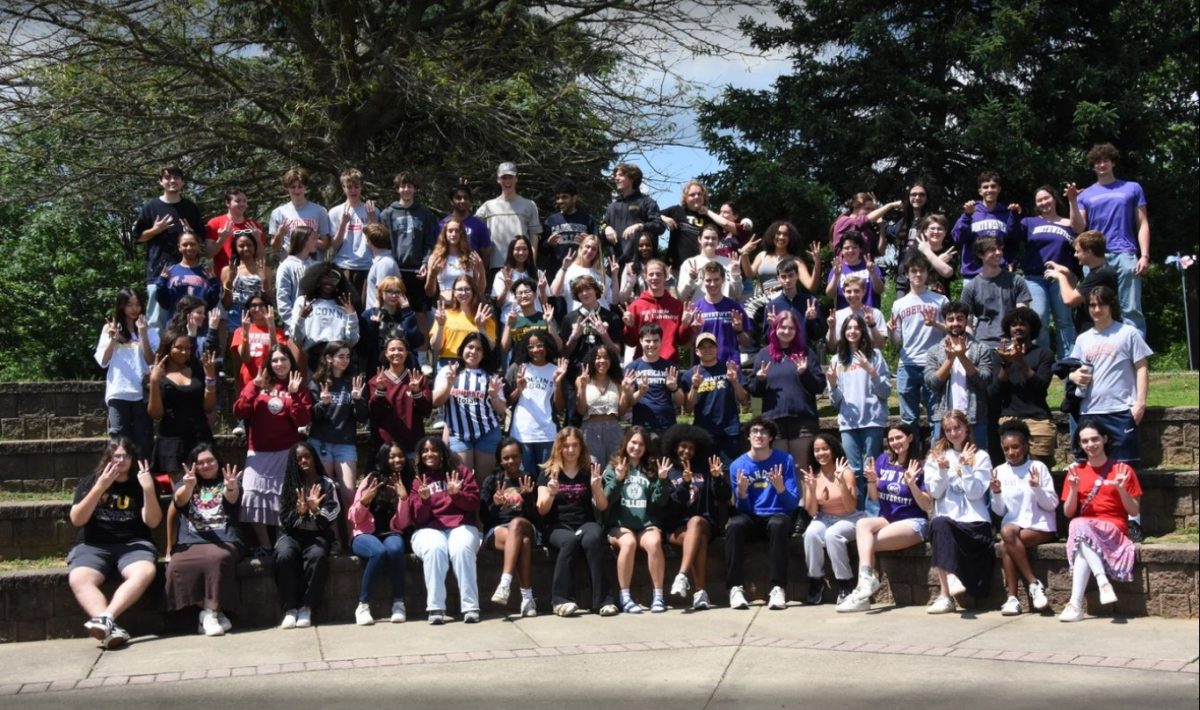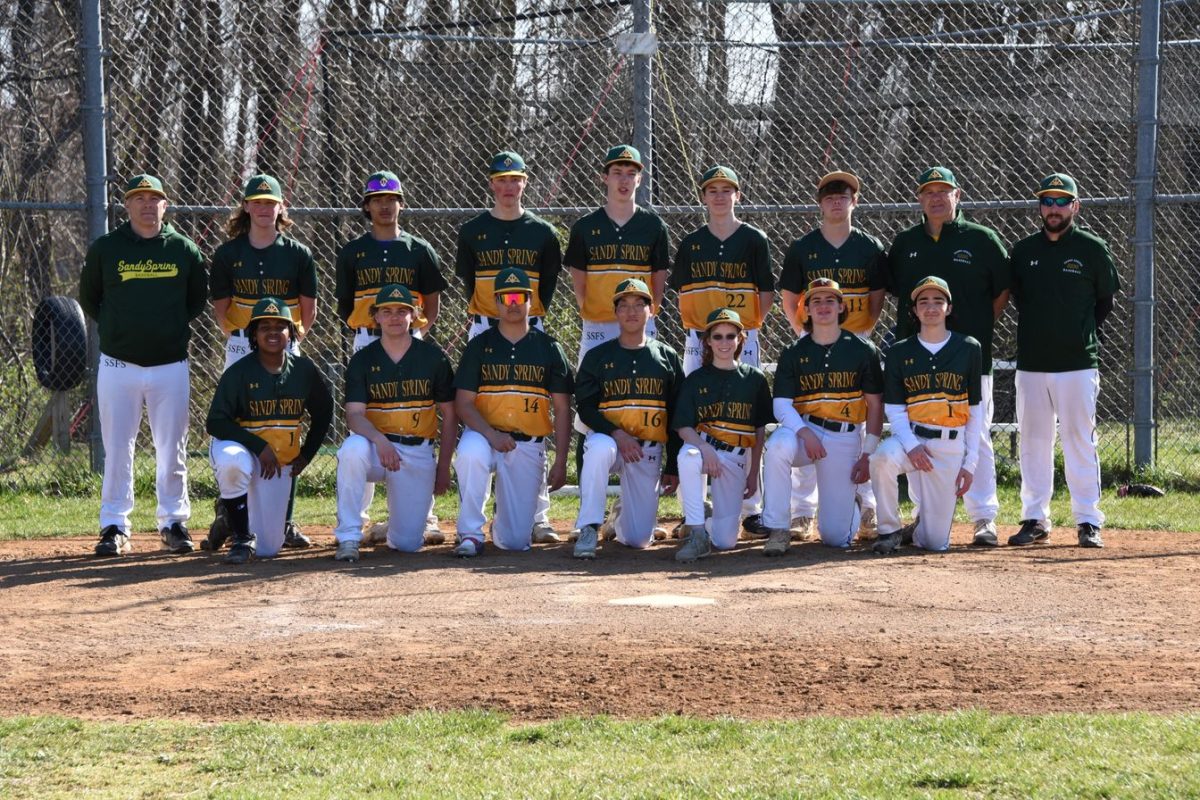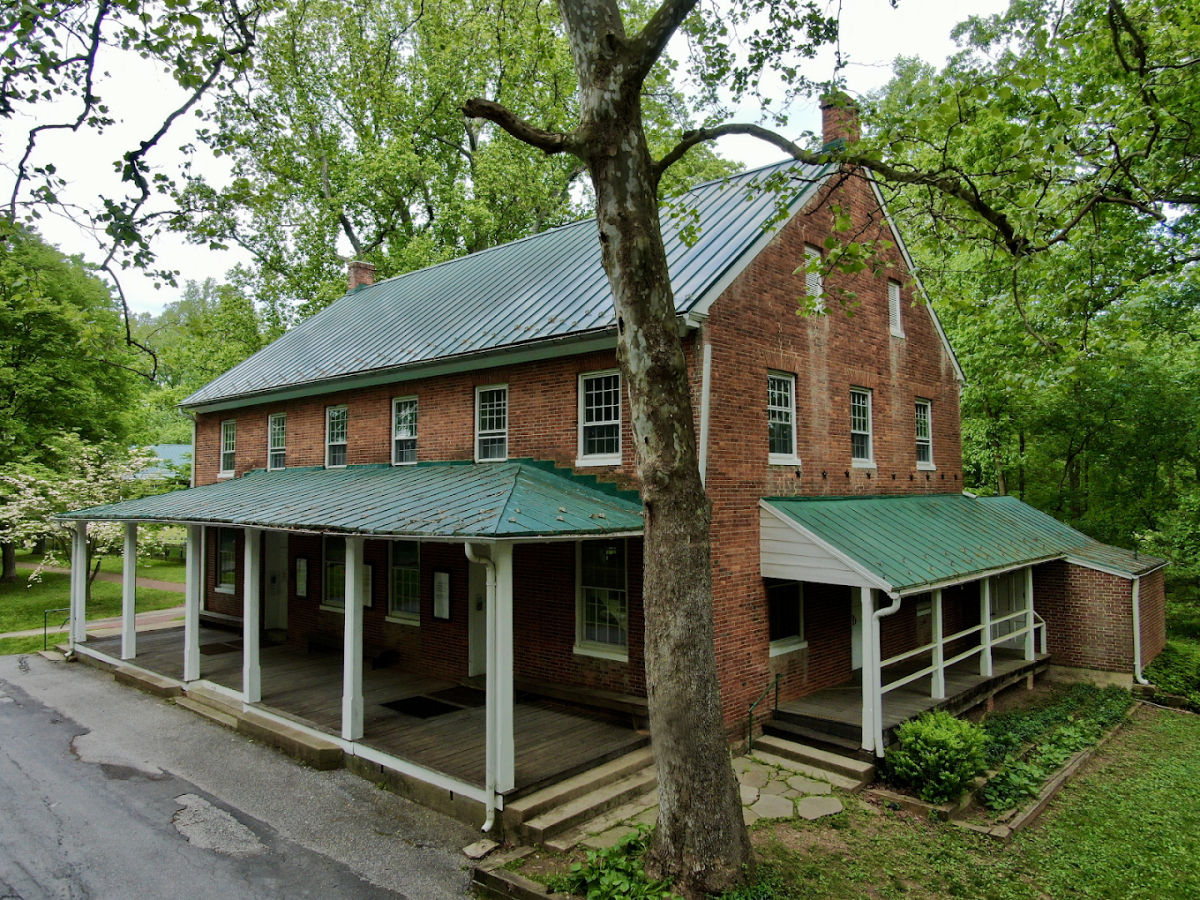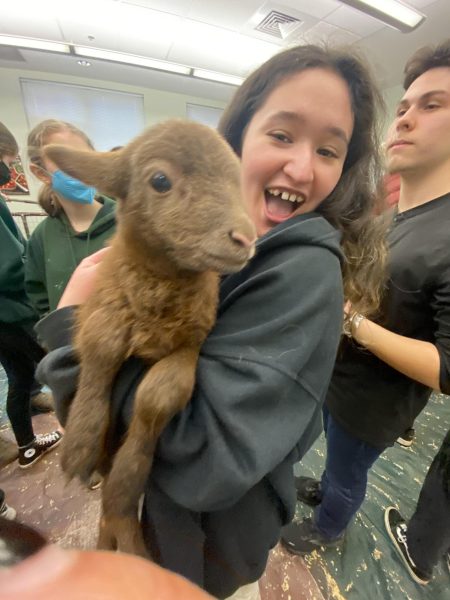The class of 2024 was forced to transition quickly into high school due to the loss of a traditional freshman year. Spending half of our first year hybrid significantly disadvantaged the connections and friendships between new and returning students. However, no matter how long you have in the community everybody had to adjust to a new Sandy Spring culture when we returned to in-person learning.
Returning to in-person school meant adapting to a modernized Upper School building, which moved student activity off the central quad and hosted most of our daily classes. In the classrooms, a bunch of fresh faces became their teachers since there had been a turnover. These new teachers and the returning seniors were now overseen by a completely new administration. Tom Gibian, Head of School for the previous 10 years, had left and Rodney Glasgow filled his position. At the end of our sophomore year the Head of Upper School, Jonathan Oglesbee, who had also been our Middle School Head until 8th grade, said his goodbye to Sandy Spring.
With Covid also came the loss of many sacred traditions, such as Intersession, the four-day camping trip before freshman year, the Community Play, and in-person all school assemblies. Academic changes included the loss of finals and midterms and three schedule changes. Taking this into consideration, I decided to interview 11 seniors and gather their opinions of how Sandy Spring functions now, and what legacy they hope to leave behind.
I first asked the seniors what they wanted to be remembered as and to this I received many different responses. Some people said they wanted us to be remembered simply as kind and welcoming people. Others expressed that they want to be remembered as a class who excelled academically, inspiring other grades to continue to focus on their academics, even while emphasizing fun. One senior who felt strongly about how challenging our transition to the Upper School was said, “we were the class that had to make that high school transition virtually. We had to work hard to be able to make those social connections when we got back.” Another senior compared us to the class of ‘23 saying, “they were able to get integrated into high school. We never got that. Literally it was middle school then boom sophomore year.” The impact of the loss of freshman year has affected the seniors all throughout high school, which became apparent to me recently when we were assigned the task of picking our second class speaker for graduation other than our current clerk. Endless meetings garnered no solution as the senior class could not all agree on one candidate, leaving it up to the senior advisors to decide. One senior summed up the alarming feeling of being in the Meeting House perfectly saying, “it’s so interesting to see as we come together as a grade, how divided we actually are.” The loss of sacred bonding traditions like the four-day camping trip before freshman year, the Intersession trip to the Florida Keys, and all school assemblies influenced our ability to make social connections significantly, not to mention we had to keep six feet apart our first two years of high school. Though regardless of our divisions, each student I interviewed exuded a quality prevalent in our entire grade: passion. Everyone I spoke to is spirited about their experiences at Sandy Spring, welcoming bittersweet nostalgia and speaking openly about the moments of their lives they will hold dear to them. Throughout my years here I have watched countless classmates pursue their interests and seek opportunities from dance, theater, and visual arts to engineering, speech and debate, and Wildezine through will and determination. I know our class will continue to make strides at college due to the endless devotion they have shown for our community for the past couple of years.
When asked about the changes that most impacted them, many mentioned the addition of the Upper School building bringing up how they love the space because having the high school centralized means you get to interact daily with the other high school grades, but many mentioned how it can limit community building between departments. Many students who were enrolled before high school spoke about sweet memories of always seeing Upper Schoolers in passing or them coming across the quad to greet them when they were in Lower School. One senior commented on the division saying, “before it was Sandy Spring and now it’s like Lower School, Middle School, Upper School.” Another senior expressed, “before we got to roam around campus…we don’t have as much of that anymore where we’re not really able to utilize every resource that we have all the time.” This student continued to stress the importance of experiential learning and how it is a quality the school often stresses the importance of though they felt as if we were lacking in its execution. This student emphasized that our campus is our “biggest asset” saying we need to “adjust the curriculum to where it forces classes to utilize the campus and to take kids outside.”
Students also mentioned the constant changes in administration and how consistent leadership forms a culture and when you lose that you “lose confidence and that connection with the highest part of the school…We need to have consistent leadership from the same person or people for years on end because that’s only that’s the only way you form a community.” This idea could easily be applied to the teacher turnover. When I asked the students if student-teacher relationships changed, most of the feedback was positive. Some mentioned that they feel some new teachers do not understand the Quaker aspect of our school but also mentioned that it is not necessarily their fault because maybe they have not taught at a Quaker institution before and that they need time to integrate. One senior summed up this sentiment saying, “teachers are also learning, relearning at the same time as the students are.” Many students highlighted that throughout their years here teachers have meant more to them than just teachers “they’re mentors or advisors or friends.” One of the seniors who has been here their whole life remarked, “my favorite thing about Sandy Spring is just how connected the student body and the teachers are.” This student continued saying that the teachers at Sandy Spring always come to class giving 100% and how that commitment to their profession inspires the students to seek opportunities to thrive and discover their passion. Even though it’s inevitable that some students and teachers won’t “gel” well together another senior postulated, “I don’t think there’s anyone at the school that can say they don’t have at least one teacher that they like going to their class, or even they don’t have a class with this teacher, but they just like talking to this teacher, maybe just venting about like something random.” Another senior also said, “you can talk to them about things that aren’t related to class, and I think that’s kind of the way it should be with a Sandy Spring experience.” Overall, the teachers at Sandy Spring seemed to be cherished by the seniors I interviewed.
Our conversations about student-teacher relationships quickly evolved into conversations about the relationship between students and administration. Most of the seniors put forward that there was a significant disconnect between the two groups but did mention how that separation could be due to Covid as it has been difficult to manage coming out of a pandemic. One senior said to have healthy communication with administration, students must place themselves in the best possible light by being respectful and aware of the repercussions of our actions. One student commented on the connection saying, “it’s so far out of reach [that] you [need] to get a TORCH position if you actively want to be heard by admin.” Another senior explained, “they feel sort of untouchable to me.” A different senior spoke about their role conducting interviews to fill the role for Director of Operations and articulated how conducting those made them realize, “we had no interaction with the people in Scott House at all and we would like to have more interaction. What we were looking for in a new person is someone who can really connect to the students in a role that requires so much student feedback, like they’re not getting so much feedback.” I then transitioned into asking the seniors how they perceive the administration’s approach to TORCH-related issues. One senior described TORCH as, “a good experience to see how the corporate world works. Things don’t always just happen. You have to keep on fighting for it, and that takes time.” Most seniors emphasized the importance of nominating students who want to put in the work to make positive change or improvements. One senior made an example of current students on TORCH emphasizing that we need, “students that are passionate about what they want to do to get it done because it was not easy for them to get those things set up, they’ve jumped through all the hoops that everybody else has to but it’s just because they were resilient about it.” Another student commented that a roadblock for TORCH has been the long turnover times when it comes to receiving responses from admin saying, “we just can’t get anything done. Nothing gets back to us on time.” Another student expressed how extensive the process can be to get something approved because “if you need to get anything done, you have to jump through so many hoops” of going through many different committees and people before you get the final okay. Every senior voiced that administration does not have the most impactful connection with students, and it could partly be because “they’re moving forward with a lot of things and they’re not checking in with the students” as one senior put it. All in all, it seems more grace needs to be given between students and administration because as students we just want to feel like we have a voice.
I then shifted to asking the seniors if they have any strong feelings on how discipline is handled here. Students who had been here in Middle School recalled that back then discipline was more case by case but now the system is more rigid. Most seniors pointed to a lack of consistency in the discipline system. One senior explained that for restorative justice to work then relationships between admin and students need to be formed instead “just punishment so things don’t happen multiple times afterwards.” Another senior spoke about how before when there was a school wide issue like stealing for example then a Meeting for Business would be had with all the students to find solutions but now it seems like the idea of being a community is not being considered as much. This senior finished their thought by saying, “It should be like a PSA to like the entire community…So it’s like incorporating the whole community. I feel like that has been lost within a discipline.” Some seniors unprompted mentioned Procedures and Discipline (P & D) which is, in their minds, when “students would listen in on another student’s case and then provide from the student perspective their advice on what they think the discipline should be.” While seniors did recognize its flaws, they most dearly missed the student input that was once granted. A couple seniors offered a solution to this, voicing that there is a Representative to the Deans on TORCH and how it would be nice if they were more utilized if the Deans need advice or are unsure about a decision as “students will stand up for other students in a way that teachers can’t and students can speak to a side of a fellow student in a way that teachers can’t.” The overall sense was that seniors do believe that administration is acting in their best interest, but they urge to have more students integrated in the discipline process. They feel positive about the faculty that are here but want to emphasize that they may not have all the answers all the time and some student voices here and there can ease this process. As this senior put it, “it’s a good system as long as it has students involved in it.”
An aspect of Sandy Spring that will forever be a part of our culture is Meeting for Worship. When I asked how they perceive the weekly practice, every senior said that it is beneficial, but they understand why it does not work for everyone. A couple students mentioned that after they received accommodations their experience greatly improved as sometimes the silence can be haunting or they can’t garner meaningful reflection in the PAC. Multiple seniors spoke about how easy it is for your social and mental battery to run out and that 20 minute pause in the day is a much needed moment of rest and relaxation. As one senior described it, “I feel like people get so lost in their lives with technology or like they get so stuck in work that they forget about the simple things. But it just helps you remember I only have one life.” Another senior stated, “it genuinely taught me how to be okay with just being by myself and with sitting and listening to myself.“ One senior said instead of seeing Meeting for Worship as simply a religious practice they could think of it as “what can you do with this time with the parameters of it being silent?…what lets your creativity or life or light shine in this space?” As the practice of Meeting for Worship may not work for all, it, along with the school’s culture, instilled important habits and values in each student interviewed. The value I heard the most was simplicity: appreciating the thing you already possess rather than the materialistic. One senior remarked that Sandy Spring taught them, “the idea of looking out for each other and seeing the best in people and continuing to try to develop good relationships.” Another senior reminisced that Sandy Spring “was like a home away from home for [them]…a valuable lesson to understand is that you should do that for other people too, you should be a safe space for other people that need it.” Finally, a senior spoke to how refreshing entering Sandy Spring was for them because they saw “people just being themselves and doing their own thing. People are reaching out to people and just taking it casually. So that really made me feel like I belong here, and I’m seen and heard here.” A lot of the experiences that taught the senior valuable lessons were also rooted in the school’s traditions.
When asked their favorite traditions a majority of the seniors immediately responded Community Day. Seniors cherish it so much because it allows us to meet faculty and students in Lower School and Middle School as “we don’t really interact with those parts of our school.” Many seniors recalled how “tight knit” Community Day was because “you take pride in your community day group” and how this would drive students from different grades to continue growing friendships outside of just Community Day. Many seniors articulated that they appreciate these traditions so much because they often crave interaction and integration with the other divisions. Other traditions mentioned were the Halloween Parade, the Grinch performance, Little Buddies, Morley Games, and Sophomore Olympics. Every senior who brought up the Sophomore Olympics could not help but remind me we were one of the first sophomore classes to ever beat the seniors in the Tug of Peace. As one senior summed up “I think that Sandy Spring can be really quirky at times. It definitely has its quirks, but it becomes a lot more fun if you embrace them.” Across the board, every student said that they were grateful to learn about and be immersed into Quakerism because it taught them to see the Light in everyone, even themselves.
Thank you to the seniors interviewed for this article: Taye Bradford, Kairava Buchwald, Evan Crone, Sam Deichman-Caswell, Nayima Fangou, Josephine Harpell, Ehi Idibia, Anderson Iskowitz, Ethan Lee, Suutumee Negash, and Taddy Vargas





